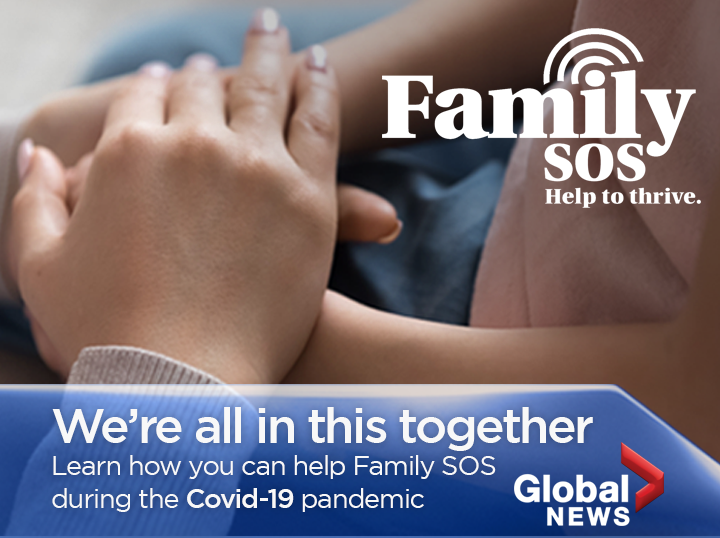We are all in this together: Global News will feature our local community partners to highlight how they are handling day-to-day operations during the COVID-19 pandemic and how you can help.

We are all navigating the ups and downs of self-isolation during the COVID-19 pandemic, but what if your self-isolation included empty cupboards, no internet and no one to look after your kids?
All across the Maritimes, thousands of organizations are modifying the way they do business, and it includes more than just restaurants offering delivery and grocery stores taping arrows to their floors.
Charitable organizations have had to pivot their day-to-day operations as well, acting quickly to accommodate the thousands of Maritimers that rely on them for daily meals, shelter and childcare who may have also added job loss to their self-isolation ups and downs.
Family SOS has been serving the Greystone, N.S. community for more than 42 years. The local non-profit knows the importance of pivoting their day-to-day operations in these challenging times.
With hundreds of families relying on them for after-school programs, meals and parenting support, it can be challenging to ensure things run as smoothly as possible while we’re forced to stay the blazes home, as Premier Stephen McNeil urged last week.
“Bringing in food is our main challenge right now because it’s such a big need: people need food and they just don’t have it,” says Victoria Law, Communications and Development Officer at Family SOS.
“Our main priority right now is getting the food out.”
Food insecurity is a problem in the Greystone community, where more than 80 families are in desperate need of food resources. Now, families, whose kids would normally be fed breakfast and lunch through Family SOS after-school programs, have to go from providing only one meal a day to all three with little to no funds to do so.

The child-centered organization works to build strong and positive families, offering free programs like in-home parenting support, teen mentoring and helping new Canadians navigate their new home.
Their goal is to empower families to gain confidence, improve health and well-being and self-sustainability, but in these uncertain times, being able to stay connected with the families that rely on Family SOS has proven to be a challenge.
“We’ve had to switch our programming and change quickly to offer people what they need right now,” Law says.

Get breaking National news
“We consider ourselves lucky because compared to other bigger non-profits, our grassroots approach enables us to restructure and put together activity packages for kids, in-lieu of our after-school programs to keep kids busy – especially those who don’t have internet access, and food packages delivered to doorsteps twice a week.”
Family SOS has used social media to their advantage, offering comfort from a distance to their followers and raise much-needed funds.
Although they’ve been receiving financial support and food donations from the United Way, Salvation Army and Feed Nova Scotia, they’re goal is to raise more money to alleviate some recent, unexpected costs associated with the pandemic.
Family SOS has created 600 ballots for the Greystone neighbourhood, asking multiple choice questions to get an idea of what the community needs the most right now (food support, prescription pick-up, activities for kids or just a friendly phone call.)
“We don’t want to tell people what they need, we want them to tell us what they need,” Law says.
The ballots were printed in both English and Arabic.
Victoria says cash donations are needed the most lately. “We need funds to buy food and supplies but people can also donate food, gift certificates or craft supplies to our Greystone location (4 Cranberry Court in Spryfield),” she said.
“It’s open every day although hours have been reduced. We can also pick up your donations if you can’t leave home.”
To donate to Family SOS, visit their website at www.familysos.ca.
Questions about COVID-19? Here are some things you need to know:
Health officials caution against all international travel. Returning travellers are legally obligated to self-isolate for 14 days, beginning March 26, in case they develop symptoms and to prevent spreading the virus to others. Some provinces and territories have also implemented additional recommendations or enforcement measures to ensure those returning to the area self-isolate.
Symptoms can include fever, cough and difficulty breathing — very similar to a cold or flu. Some people can develop a more severe illness. People most at risk of this include older adults and people with severe chronic medical conditions like heart, lung or kidney disease. If you develop symptoms, contact public health authorities.
To prevent the virus from spreading, experts recommend frequent handwashing and coughing into your sleeve. They also recommend minimizing contact with others, staying home as much as possible and maintaining a distance of two metres from other people if you go out.
For full COVID-19 coverage from Global News, click here.













Comments